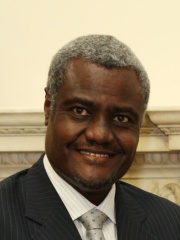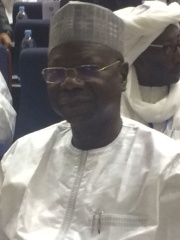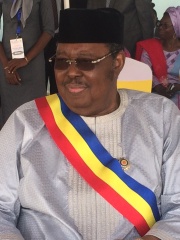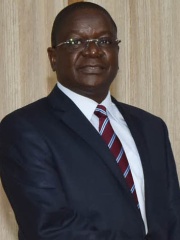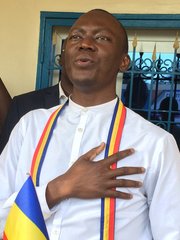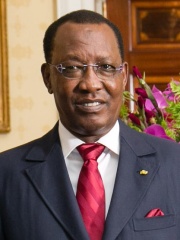
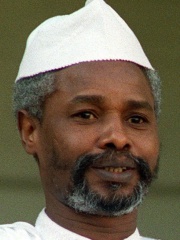
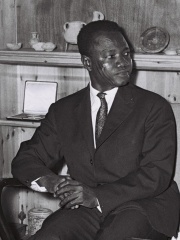
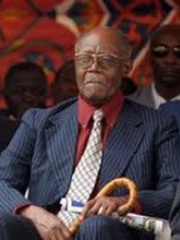
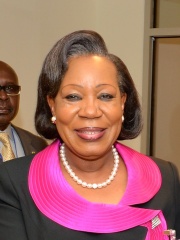



The Most Famous
POLITICIANS from Chad
This page contains a list of the greatest Chadian Politicians. The pantheon dataset contains 19,576 Politicians, 16 of which were born in Chad. This makes Chad the birth place of the 123rd most number of Politicians behind Dominican Republic, and Central African Republic.
Top 10
The following people are considered by Pantheon to be the top 10 most legendary Chadian Politicians of all time. This list of famous Chadian Politicians is sorted by HPI (Historical Popularity Index), a metric that aggregates information on a biography's online popularity. Visit the rankings page to view the entire list of Chadian Politicians.

1. Idriss Déby (1952 - 2021)
With an HPI of 70.52, Idriss Déby is the most famous Chadian Politician. His biography has been translated into 78 different languages on wikipedia.
Idriss Déby Itno (Arabic: إدريس ديبي Idrīs Daybī Itnū; 18 June 1952 – 20 April 2021) was a Chadian politician and military officer who was the sixth president of Chad from 1991 until his death in 2021 during the Northern Chad offensive. His term of 30 years makes him Chad's longest-serving president. Déby was a member of the Bidayat clan of the Zaghawa ethnic group. A high-ranking commander of President Hissène Habré's military during the 1980s, Déby played important roles in the Toyota War which led to Chad's victory during the Chadian-Libyan War. He was later purged by Habré after being suspected of plotting a coup, and was forced into exile in Libya. He took power by leading a coup d'état against Habré in December 1990 and was immediately proclaimed transitional president, whom Déby served until he was officially proclaimed president on 28 February 1991. Despite introducing a multi-party system in 1992 after several decades of one-party rule under his predecessors, throughout his presidency, Déby's party, the Patriotic Salvation Movement (MPS) was the dominant party. Déby won presidential elections in 1996 and 2001, and after term limits were eliminated he won again in 2006, 2011, 2016, and 2021. During the Second Congo War, Déby briefly ordered military intervention on the side of the Congolese government but soon withdrew when his forces were accused of looting and human rights abuses. In the early 2000s, oil was discovered in Chad, and Déby made petroleum production the driving force of the country's economy. He survived various rebellions and coup attempts against his own rule, including a rebellion led by his former defense minister Youssouf Togoïmi from 1998 to 2002 as well as a civil war from 2005–2010 provoked by the refugee crisis of the War in Darfur in neighboring Sudan. Several international media sources have described Déby as authoritarian. During his three decades in office, Chad experienced democratic backsliding, as well as widespread corruption, including cronyism, embezzlement, and a deeply entrenched patronage system. In 2016, the Front for Change and Concord in Chad (FACT) was established with the goal of overthrowing Déby's government. In April 2021, FACT initiated the Northern Chad offensive; Déby was injured on 19 April while commanding troops on the frontline fighting the militants and died the following day.

2. Hissène Habré (1942 - 2021)
With an HPI of 69.52, Hissène Habré is the 2nd most famous Chadian Politician. His biography has been translated into 47 different languages.
Hissène Habré (Arabic: حسين حبري Ḥusaīn Ḥabrī, Chadian Arabic: pronounced [hiˈsɛn ˈhabre]; French pronunciation: [isɛn abʁe]; 13 August 1942 – 24 August 2021), also spelled Hissen Habré, was a Chadian politician and convicted war criminal who served as the fifth president of Chad from 1982 until he was deposed 1990. A Muslim from northern Chad, Habré joined FROLINAT rebels in the first Chadian Civil War against the southern-dominated Chadian government. Due to a rift with fellow rebel commander Goukouni Oueddei, Habré and his Armed Forces of the North rebel army briefly defected to Felix Malloum's government against Oueddei before turning against Malloum, who resigned in 1979. Habré was then given the position of Minister of Defense under Chad's new transitional coalition government, with Oueddei as President. Their alliance quickly collapsed, and Habré's forces overthrew Oueddei in 1982. Having become the country's new president, Habré created the National Union for Independence and Revolution (UNIR) as the country's sole legal party in 1984. His dictatorship was notorious for widespread human rights abuses by his secret police, the Documentation and Security Directorate (DDS). He was brought to power with the support of France and the United States, who provided training, arms, and financing throughout his rule due to his opposition to Libyan leader Muammar Gaddafi. He led the country during the Libyan-Chadian conflict, culminating in victory during the Toyota War from 1986 to 1987 with French support. He was overthrown three years later in the 1990 Chadian coup d'état by Idriss Déby and fled into exile in Senegal. In May 2016, Habré was found guilty of human-rights abuses, including rape, sexual slavery, and ordering the killing of 40,000 people by an international tribunal in Senegal in collaboration with the African Union and sentenced to life in prison. He was the first former head of state to be convicted for human rights abuses in the court of another nation. He died on 24 August 2021, after testing positive for COVID-19.

3. François Tombalbaye (1918 - 1975)
With an HPI of 68.34, François Tombalbaye is the 3rd most famous Chadian Politician. His biography has been translated into 41 different languages.
François Tombalbaye (Arabic: فرنسوا تومبالباي Franswā Tūmbālbāy; 15 June 1918 – 13 April 1975), also known as N'Garta Tombalbaye, was a Chadian politician who served as the first President of Chad from the country's independence in 1960 until his overthrow in 1975. A dictatorial leader, his divisive policies as president led to factional conflict and a pattern of authoritarian leadership and political instability that is still relevant in Chad today. A native of the south of the country and a member of the Sara ethnic group, Tombalbaye began his career as a teacher during French colonial rule and joined the Chadian Progressive Party (PPT) in 1946. After serving in the colonial legislature in the 1950s, he succeeded Gabriel Lisette as the PPT's leader in 1959 and was appointed the country's first president upon gaining independence in 1960. In 1962, he declared the PPT the sole legal party and presided over a corrupt dictatorship characterized by extreme favoritism to his southern-based patronage network. In addition to his dictatorial rule, he also attempted an Africanization program that worsened the divide between the Muslim north and the Christian and animist south. In 1965, tax riots erupted into a civil war between his government and northern FROLINAT rebels. During the war, his regime was supported by France, while FROLINAT was supported by Libyan leader Muammar Gaddafi. In 1973, he founded a new party, the National Movement for the Cultural and Social Revolution (MNRCS), changed his name to N'Garta Tombalbaye and attempted to further Africanize the country through a program of authenticité. As the civil war continued and his support in the south dwindled, particularly over his imposition of yondo, a form of ritual scarring on members of the civil service and military, he was overthrown and assassinated by members of the Chadian military during the 1975 Chadian coup d'état and replaced by Félix Malloum.

4. Félix Malloum (1932 - 2009)
With an HPI of 63.71, Félix Malloum is the 4th most famous Chadian Politician. His biography has been translated into 31 different languages.
Félix Malloum Ngakoutou Bey-Ndi (Arabic: فليكس معلوم Filiks Mʿalūm; 10 September 1932 – 12 June 2009), better known as Félix Malloum, was a Chadian military officer and politician who served as the second president of Chad from 1975 until his resignation in 1979. A native of southern Chad, Malloum became a high-ranking officer in the Chadian military under the country's first president, François Tombalbaye. In the context of the first Chadian Civil War, he was arrested and imprisoned by Tombalbaye in 1972 after being suspected of plotting a coup. Following Tombalbaye's overthrow and assassination during the 1975 Chadian coup d'état, he became the country's new president, inheriting the civil war against northern rebels. In 1978, he integrated the forces of rebel leader Hissène Habré, who was appointed prime minister, into his military to fight against rival rebel leader Goukouni Oueddei. Their alliance was short-lived, and Habré soon turned against Malloum in 1979. Under the terms of the Kano Accord, Malloum resigned, while a new transitional government was created using a power-sharing agreement between Habré and Goukouni. After spending 23 years in exile in Nigeria, he returned to Chad in 2002 and died in a hospital in France seven years later.

5. Goukouni Oueddei (b. 1944)
With an HPI of 62.60, Goukouni Oueddei is the 5th most famous Chadian Politician. His biography has been translated into 25 different languages.
Goukouni Oueddei (Arabic: كوكوني عويدي Kūkūnī ʿWaīday; born 1944) is a Chadian politician who served as the fourth president of Chad from 1979 until he was deposed in a coup in 1982. He previously served in this role as acting president from March to April 1979. A northerner, Goukouni commanded FROLINAT rebels with Libyan support during the first Chadian Civil War against Chad's southern-dominated government. Upon the rebel victory and the resignation of President Felix Malloum in 1979, he became the new president of Chad's new transitional coalition government by the terms of the Lagos Accord, with rival fellow rebel commander Hissène Habré as defense minister. Goukouni pursued a pro-Libya policy; continued differences with Habré, who opposed Libya, led to him being overthrown by Habré's forces in 1982. He then became the foremost opponent to Habré's new government, and fought against him during the Libyan-Chadian conflict as a Libyan-backed rebel leader. In 1985, due to a supposed rift with his Libyan allies, he went into exile.

6. Catherine Samba-Panza (b. 1954)
With an HPI of 62.10, Catherine Samba-Panza is the 6th most famous Chadian Politician. Her biography has been translated into 39 different languages.
Catherine Samba-Panza (née Souga; born 26 June 1954) is a Central African politician who served as Transitional President of the Central African Republic from 2014 to 2016. She was the first woman to serve as head of state in the Central African Republic. Prior to her tenure as acting president, she was the Mayor of Bangui from 2013 to 2014. Samba-Panza began her career operating an insurance brokerage and working as a women's rights advocate. She was chosen in 2003 to serve as the vice president of a national reconciliation conference, and she was then chosen as president of the subsequent committee to implement the conference's recommendations. She was appointed mayor of Bangui in 2013 after the city was devastated by the Central African Republic Civil War. She was then appointed to serve as transitional president of the Central African Republic in 2014. She was tasked with restoring stability to the nation by disarming militant groups, and she emphasized the nation's economic recovery through employment and foreign aid. Her term ended in 2016. She was a presidential candidate in the 2020–21 election, but she was unsuccessful.

7. Pascal Yoadimnadji (1950 - 2007)
With an HPI of 55.17, Pascal Yoadimnadji is the 7th most famous Chadian Politician. His biography has been translated into 22 different languages.
Pascal Yoadimnadji (April 8, 1950 – February 23, 2007) was a Chadian politician. He was Prime Minister of Chad from February 2005 to his death in February 2007.

8. Lol Mahamat Choua (1939 - 2019)
With an HPI of 55.08, Lol Mahamat Choua is the 8th most famous Chadian Politician. His biography has been translated into 21 different languages.
Lol Mahamat Choua (Arabic: لول محمد شوا; 15 June 1939 – 15 September 2019) was a Chadian politician who served as his country's head of state for four months in 1979. He was the President of the Rally for Democracy and Progress (RDP) political party. An adherent of Islam and a member of the Kanembu ethnic group, Choua came into power during the First Chadian Civil War. The Popular Movement for the Liberation of Chad (MPLT), a Kanembu rebel group backed by Nigeria, along with the central government, the Armed Forces of the North (FAN) and the People's Armed Forces (FAP) were the main combatants. When a peace conference was organized in Kano, Nigeria, the MPLT, which suffered from a lack of members, chose Lol to head its delegation to meeting. Under Nigerian pressure, Lol was made head of the Transitional Government of National Unity (Gouvernement d'Union Nationale de Transition or GUNT) on 29 April 1979 by the four factions present at Kano I. The GUNT included 21 ministers, of whom 11 were northerners and 10 were southerners. Goukouni Oueddei, head of the FAP, became Interior Minister, Hissène Habré became Defence Minister, and Wadel Abdelkader Kamougué, leader of the Chadian Armed Forces (FAT), became vice-president. But the transitional government excluded all the pro-Libyan forces; as a result, a rival government, backed by Muammar al-Gaddafi, was formed; it was called the Democratic Revolutionary Council, and it was headed by Ahmat Acyl, an Arab. The problem of the rival government, and the transitional government's resistance to Nigerian influence, led to two new peace conferences, this time in Lagos, Nigeria. On 21 August an agreement between all factions, those of the CDR included, was signed; it became known as the Lagos Accord. The accord brought to the replacement of Choua with Goukouni as head of the transitional government, an act that was accomplished on 3 September. Choua served as minister of transport in Habré's government, starting in 1982 to 1985, after returning from exile in Paris since 1979. Idriss Déby overthrew Habré in 1990, and when he legalized opposition parties in 1992, one of them was Choua's Rally for Democracy and Progress (RDP), based mainly in Kanem Region. From 15 January 1993 to 7 April 1993 the Sovereign National Conference, which initiated the transition to multiparty elections, was held. Among the decisions of the conference was to form a transitional legislative body, the Higher Transitional Council (Conseil supérieur de la transition, or CST), composed of 57 members, which had Choua as its president. Choua served as President of the CST until he came into conflict with Déby, and as a result the CST replaced him with Mahamat Bachir, a loyalist of Déby's Patriotic Salvation Movement (MPS), on 15 October 1994. In June 1996, the first multiparty presidential election in Chad's history were held. Choua placed fifth, taking 5.93% of the vote, while Déby won in the second round, held in July. He was elected to the National Assembly as an RDP candidate in the first round of the 1997 parliamentary election. In the 2001 presidential election, the RDP supported Déby, and the party, in alliance with Déby's Patriotic Salvation Movement (MPS), won 12 seats (out of 155) in the April 2002 parliamentary election. Choua himself was re-elected to the National Assembly as an RDP candidate from Mao constituency in Kanem Department. Choua is the President of the RDP Parliamentary Group in the National Assembly. In 2005, during the constitutional referendum on the elimination of presidential term limits, Choua and his party boycotted the vote. Following an August 2007 agreement between political parties on preparations for a new parliamentary election in 2009, Choua headed a committee overseeing the implementation of the agreement. According to the RDP, on 3 February 2008, during a battle between government forces and rebels for control of N'Djamena, Choua was arrested by members of the presidential guard, who "acted with incredible brutality", and taken away in the back of a truck. Following international expressions of concern regarding the fate of Choua and two other opposition politicians (Ibni Oumar Mahamat Saleh and Ngarlejy Yorongar) who were also reportedly arrested, Interior Minister Ahmat Mahamat Bachir said on 14 February that Choua had been "found" and that he was still alive. Also on 14 February the French Ministry of Foreign Affairs said that the French ambassador to Chad had been allowed to visit Choua, who was being held in a military prison. On 16 February Minister of Communications, Hourmadji Moussa Doumgor, said that Choua was being held with prisoners of war. Foreign Minister Ahmad Allam-Mi said on 22 February that Choua had been found working with the rebels in flagrant délit and was being held for investigation. The RDP sharply denounced this claim. On 26 February the government announced that Choua was being placed under house arrest.

9. Noël Milarew Odingar (1932 - 2007)
With an HPI of 54.07, Noël Milarew Odingar is the 9th most famous Chadian Politician. His biography has been translated into 18 different languages.
Noël Milarew Odingar (5 May 1932 – 29 April 2007) was a Chadian military officer who served as head of state for two days after the 1975 coup d'état. He was subsequently one of the nine members of the Supreme Military Council, the military junta that ruled Chad between 1975 and 1978. An ethnic Sara, Odingar was born on 5 May 1932. As a graduate of the French military academy he had a rapid career, and in 1965 Odingar, with the grade of Major, took the post as commander of the Chadian Armed Forces (FAT), a choice that strengthened Sara dominance of the government. By 1968 the military situation in the country had badly deteriorated, after the creation of the rebel insurgent group FROLINAT in 1966 and the consequent loss of control by the government of many of the country's Muslim regions. As a result, President François Tombalbaye asked France to send troops to help defeat the rebels; the only ones who opposed themselves, in vain, to this decision, were Minister Bangui and Colonel Odingar, who objected that the project would indicate Chad's suzerainty. As the years passed, Odingar gained further promotions: by early 1975 he had become general and acting commander of the FAT's 4,000 troops. Great discontent was brewing in the army's ranks: in the last two years Tombalbaye's action had become more and more erratic, and in 1973 he had thrown in jail the FAT's commander-general Félix Malloum. It was another purge in the army, in which Tombalbaye had arrested the commanders of the gendarmerie (the military police), that triggered the 1975 coup: on the morning of 13 April units of the gendarmerie attacked the Presidential Palace. While these were fighting with the President's guard, Odingar arrived bringing reinforcements and assuming command. All fighting ended by 8:30 am, with Tombalbaye reportedly dying from the wounds received in the battle and the coupists triumphantly taking the palace. There was no other resistance: already at 6:30 am Odingar had spoken to the radio announcing the armed forces had "exercised their responsibilities before God and the nation" while the capital's population poured into the streets to celebrate the death of Tombalbaye. Odingar and the army justified their actions in a military communique that accused Tombalbaye of having divided the country, putting the tribes one against the other, and of having humiliated the military. In the meanwhile Odingar, acting as interim commander and head of state, sealed off all roads to the capital and imposed a curfew on the city. Félix Malloum and the other jailed officers were immediately freed by the coupists. Already on 15 April a Supreme Military Council (Conseil Superieur Militaire or CSM) was formed, a nine-member military junta whose President was chosen to be Malloum, who so peacefully succeeded to Odingar as head of state.
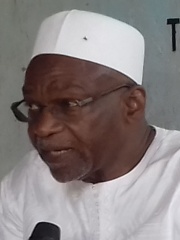
10. Saleh Kebzabo (b. 1947)
With an HPI of 53.84, Saleh Kebzabo is the 10th most famous Chadian Politician. His biography has been translated into 18 different languages.
Saleh Kebzabo (Arabic: صالح كبزابو, born 27 March 1947 in Léré, Chad) is a Chadian politician. He is the President of the National Union for Democracy and Renewal (UNDR) and a Deputy in the National Assembly of Chad. He was designated Prime Minister by president Mahamat Déby on 12 October 2022.
People
Pantheon has 17 people classified as Chadian politicians born between 1918 and 1983. Of these 17, 10 (58.82%) of them are still alive today. The most famous living Chadian politicians include Goukouni Oueddei, Catherine Samba-Panza, and Saleh Kebzabo. The most famous deceased Chadian politicians include Idriss Déby, Hissène Habré, and François Tombalbaye. As of April 2024, 1 new Chadian politicians have been added to Pantheon including Succès Masra.
Living Chadian Politicians
Go to all RankingsGoukouni Oueddei
1944 - Present
HPI: 62.60
Catherine Samba-Panza
1954 - Present
HPI: 62.10
Saleh Kebzabo
1947 - Present
HPI: 53.84
Youssouf Saleh Abbas
1952 - Present
HPI: 53.24
Moussa Faki
1960 - Present
HPI: 53.16
Delwa Kassiré Koumakoye
1949 - Present
HPI: 52.29
Kalzeubet Pahimi Deubet
1957 - Present
HPI: 49.72
Haroun Kabadi
1949 - Present
HPI: 49.66
Albert Pahimi Padacké
1966 - Present
HPI: 49.36
Succès Masra
1983 - Present
HPI: 44.97
Deceased Chadian Politicians
Go to all RankingsIdriss Déby
1952 - 2021
HPI: 70.52
Hissène Habré
1942 - 2021
HPI: 69.52
François Tombalbaye
1918 - 1975
HPI: 68.34
Félix Malloum
1932 - 2009
HPI: 63.71
Pascal Yoadimnadji
1950 - 2007
HPI: 55.17
Lol Mahamat Choua
1939 - 2019
HPI: 55.08
Noël Milarew Odingar
1932 - 2007
HPI: 54.07
Newly Added Chadian Politicians (2025)
Go to all RankingsOverlapping Lives
Which Politicians were alive at the same time? This visualization shows the lifespans of the 6 most globally memorable Politicians since 1700.


